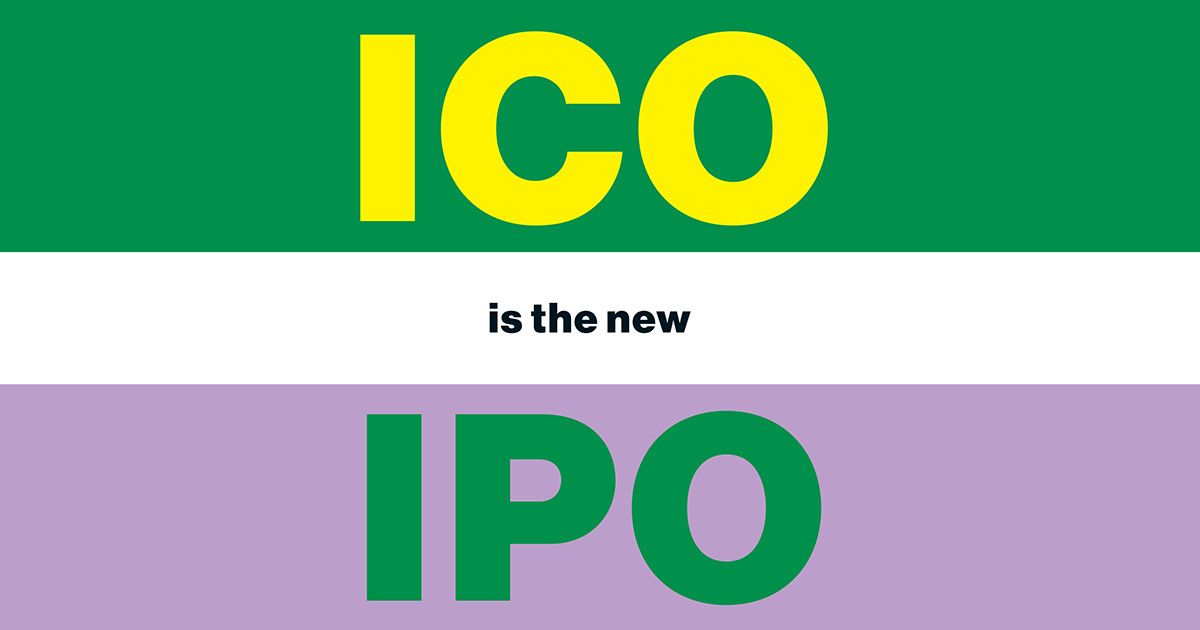The Death of the ICO (And 4 Other 2018 Predictions)

- The passing of the ICO token

"Digital currency" turned into a noteworthy trendy expression in 2017. All of a sudden, everyone's eyes were on these new resources with theorists hopping into the market in large numbers and controllers vigorously examining them.
Truth be told, toward the beginning of December, the joined market capitalization of every single computerized cash outperformed that of JPMorgan, the greatest U.S. bank. Introductory coin offerings (ICOs) comparatively detonated, raising a huge number of dollars around the globe in a matter of months.
While they made for energizing features, however, I expect the extravagance around ICOs to fail in 2018.
In addition, I additionally expect controllers and specialists worldwide to bring the pain on false ICOs in the new year. That is on the grounds that numerous ICOs evaded existing control so as to raise value — with no strong business to move down the advertising. Assets raised from some of these endeavors have just begun to vanish, and controllers, for example, the SEC, as of late reported that they're preparing to take action against them.
I wouldn't be amazed to see powerful fines, suit and even correctional facility time for those remaining on the wrong side of the ICO issue.
Past the administrative crackdown, inquiries will emerge around the utility of uncommon reason tokens. For what reason would a record facilitating organization acknowledge installment in Filecoin, when a universally useful advanced resource is a great deal more fluid and in this way less demanding to transform into fiat?
We don't utilize distinctive monetary standards to purchase garments or pay our home loan in the physical world and ICO token holders will understand the financial aspects are the same on the web.
- Monetary establishments will receive advanced resources
In the event that examiners entered the computerized resource advertise by the thousand a year ago, 2018 will be the year that major institutional players like resource directors, annuity reserves and other money related foundations, for example, installment suppliers, enter the space.
We're now observing expanded over-the-counter (OTC) exchanging of computerized resources, for example, bitcoin on the Chicago Board Options Exchange (CBOE), making liquidity over the market extend. It's extremely a matter of when, not if, postings of extra digital currency fates on OTC trades will occur. My wager? We'll see the postings by next summer.
Amongst this and new institutional players entering the market, I think advanced resources have a lot of space for development. Be that as it may, the crypto space won't be without its difficulties. Forking, direction, and managing an account — gracious my!
Administration issues will keep on plagueing some advanced resources — causing forks, for example, the one with bitcoin and bitcoin money. This precariousness will be dangerous for some who need to enter the market as it brings up issues about supply and additionally the level of hazard included.
The unverifiable administrative condition in the U.S., China and somewhere else could likewise smother encourage advancement of the computerized resource showcase. While nations like Japan and the Philippines have grasped computerized resources in their economies and administrative structures, there are numerous more worldwide without clear strategies and laws for these benefits.
They should take a page from the separate books of Japan and the Philippines with a specific end goal to empower new administrations, increment money related consideration, and lower boundaries to financial development.
For instance, there are just a modest bunch of money related foundations in the U.S. that will bank organizations in the cryptographic money space. If they somehow managed to exit, or if control somehow managed to get through that precludes introduction to the advanced resource advertise, this could have intense, antagonistic outcomes on the enhanced administrations being created. Banks require clear rules from controllers on how they can legally bank those related with digital forms of money.
- Blockchains will begin to interoperate
In 2017, we've seen bitcoin's offer of the cryptographic money showcase drop from 87 percent to under 50 percent. Many new coins and tokens propelled and are currently being exchanged.
To make the expansive utilization of advanced resources genuinely standard, in any case, I think we'll require the numerous blockchain systems that presently exist to interoperate. The fact of the matter is there won't be one single prevailing blockchain arrange later on — similarly as there isn't any predominant web or email supplier all around today.
As of now, we would all be able to email family, companions and associates from Gmail to Yahoo to Outlook consistently and in a split second. Esteem should move over all records in the very same way - — independent of the blockchain arrange, PayPal wallet or conventional financial balance included.
In fact, we've just observed endeavors in 2017 to address blockchain interoperability.
Raiden, the ethereum interoperability answer for ERC-20 tokens, propelled its token in September, while the Interledger Protocol (ILP) was utilized to interface seven records including bitcoin, ethereum and XRP in June. My cash is (obviously) on Interledger.
In the event that all systems were to end up ILP-empowered, it at last wouldn't make any difference in the event that you held bitcoin, ether, litecoin or XRP. ILP would enable you to make installments to a trader that exclusive acknowledges bitcoin, for instance, utilizing XRP — all in simply an issue of seconds.
- The introduction of half and half blockchains
As of not long ago we've seen a multiplication of both open blockchains like bitcoin and private blockchains like Hyperledger Fabric. Going ahead, I think we'll begin to see the ascent of mixture blockchains, which join the best of the two universes.
A half and half blockchain keeps running on the open web and is available to anybody like an open blockchain, however it utilizes a littler arrangement of validators and is more focused towards a particular utilize case like a private blockchain.
Sending an ethereum contract or making an ERC-20 token will be supplanted by propelling your own particular scaled down blockchain, which can be tuned to the correct needs of a given venture.
Need more decentralization? Less? All the more intense usefulness? Would it be advisable for it to be redesigned habitually or stay extremely steady? One size doesn't fit all, however one year from now you'll at long last have the capacity to pick.
This will be a piece of a bigger pattern for blockchain systems to practice. Current frameworks attempt to be everything to everyone. Later on, we'll see more focused on executions intended for an unmistakable utilize case. The most ideal approach to clarify why this is fundamental is to point to the Yahoo illustration — a tech mammoth that spread itself thin crosswise over excessively numerous items and benefits, and couldn't be really fruitful in any of them.
Similarly that Google concentrated on information, or Apple on plan, I think those blockchains that emphasis on one center offering (e.g. an unadulterated database like BigchainDB) will survive, and flourish.
- Specialization or speculation — a logical inconsistency?
Through the span of this article, I've contended that broadly useful tokens will supplant uncommon reason tokens and I've likewise said that unique reason blockchains will supplant universally useful blockchains.
This may appear like a logical inconsistency at initially, however as blockchains turn out to be more interoperable, blockchains and tokens will just be less coupled together. This change will include additionally developing agonies, so it's certain to be an intriguing year.

I'm eager to perceive how everything plays out.